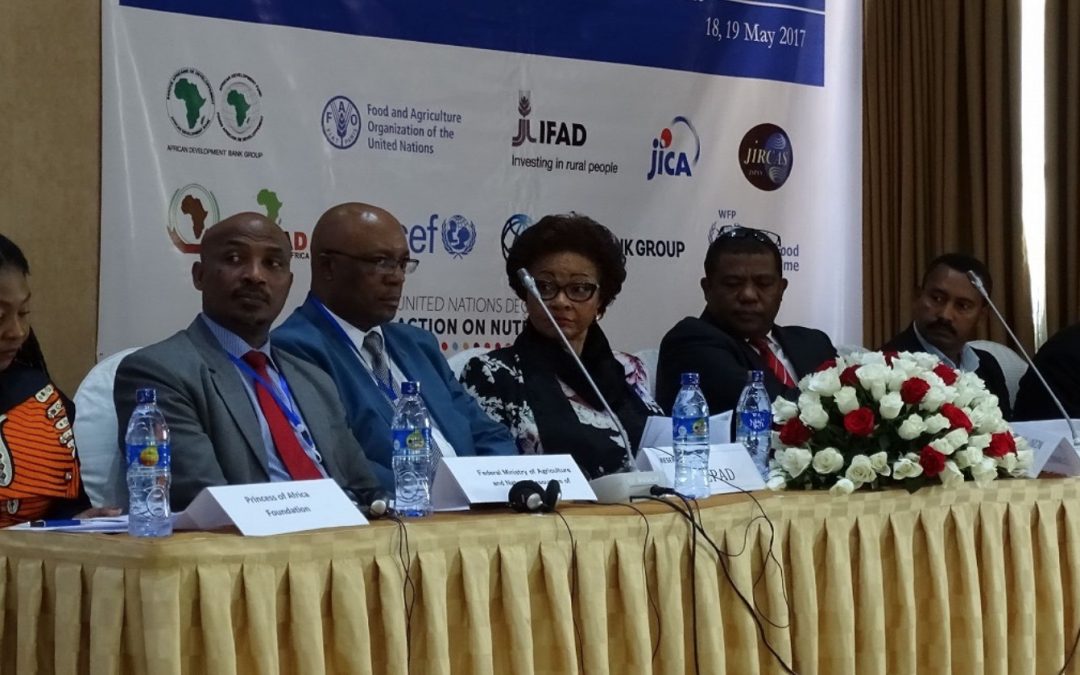The First Partners’ Meeting for the Initiative for Food and Nutrition Security in Africa (IFNA) was held from 18 – 19 May 2017 in Addis Ababa, Ethiopia. It displayed collaboration amongst partners in exploring and identifying possible solutions through IFNA with the aim of achieving food and nutrition security in Africa. The meeting served as a platform for participants to meet new partners in extending and strengthening their food and nutrition security networks in Africa. The event also provided an opportunity for partners to share best practices, to discuss challenges and to highlight lessons learnt which collectively facilitated a common understanding of the IFNA goals amongst participants.
The three objectives of the First Partners’ Meeting were:
- to develop a shared understanding of IFNA with the partners by sharing good examples of business models, challenges and lessons useful for IFNA’s implementation;
- to update the partners on the progress of IFNA’s implementation since the launch in August 2016; and
- to contribute to the global sensitization of nutrition.
Participants exceeded 160, including African governments, development partners, international organisations, research institutions, funding agencies, civil society organisations and private corporations.
The IFNA participating countries present were Burkina Faso, Ethiopia, Kenya, Madagascar, Malawi, Mozambique, Ghana, Nigeria, Senegal and Sudan. Other countries present were Angola, Chad, the Democratic Republic of Congo, Egypt, Fiji, Japan, Lesotho, Morocco, Namibia, Niger, Sierra Leon, South Africa and Rwanda.
The other participants present were:
- Africa Improved Foods
- African Development Bank (AfDB)
- Bioversity
- Department for International Development (DFID) Ethiopia
- Food and Agricultural Organisation (FAO)
- GIZ
- Global Alliance for Improved Nutrition (GAIN)
- Helen Keller International
- Impression Trading and Investments
- Intergovernmental Authority on Development (IGAD)
- International Center for Tropical Agriculture (CIAT)
- International Food Policy Research Institute (IFPRI)
- International Fund for Agricultural Development (IFAD)
- International Institute of Tropical Agriculture (IITA)
- International Maize and Wheat Improvement Center (CIMMYT)
- International Potato Centre
- Japan International Cooperation Agency (JICA)
- Japan International Research Center for Agricultural Sciences (JIRCAS)
- Japan Results
- New Partnership for Africa’s Development (NEPAD)
- Princess of Africa Foundation
- Sasakawa Africa Foundation
- Save the Children
- SDG Centre
- Power of Nutrition
- UN Women
- United Nations Children’s Fund (UNICEF)
- United Nations Development Programme (UNDP)
- United Nations Educational, Scientific and Cultural Organisation (UNESCO)
- United Nations High Commissioner for Refugees (UNHCR)
- United Nations Population Fund (UNFPA)
- Water Aid
- World Bank
- World Food Programme (WFP)
- World Health Organisation (WHO)
- World Vegetable Centre
At the meeting, the following matters were inter alia discussed:
- IFNA’s overview which included the expected operating model, synergetic impacts of a multisectoral approach and coordination among short, mid- and long-term interventions.
- Results of the contact missions to the ten (10) participating countries; Overall, government entities, development partners and other relevant stakeholders of each country showed positive responses to the Initiative, and the governments in all participating countries agreed to join IFNA.
- Mid-term plan and annual plan for 2017; The mid-term plan revealed that the core activities of the IFNA Secretariat comprised of advocacy, meetings, reports and knowledge/experience sharing, monitoring & evaluation, research activities as well as other matters as stipulated in its Operational Guidelines. The plans were well received by the participants.
- IFNA Guiding Principles; The latest version of the IFNA Guiding Principles was shared with the participants. The participants commended IFNA’s efforts to ensure the quality and comprehensiveness of the document, and shared their comments and inputs to further elaborate on the clarity of the principles and to shed some light on the scope of IFNA activities.
- Some partners made statements which presented their mandates, ongoing activities, achievements, experiences and ways in which they could contribute to/create linkage with IFNA. Subsequently, others made statements, expressing their support for and expectations from the Initiative.

Recent Comments